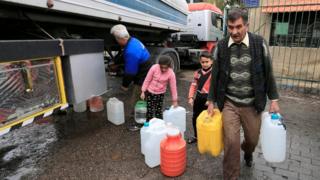 Image copyright
Image copyright
AP
The Ain al-Fijeh spring provides 70% of all Damascus water
UN human rights experts say the Syrian air force deliberately bombed a spring outside Damascus in December, cutting off the water supply for 5.5 million people living in and around the city.
The Syrian government blamed rebels for damaging the Ain al-Fijeh spring during the battle for the Wadi Barada valley.
But a new report by a UN commission of enquiry says evidence showed the damage was caused by at least two air strikes.
The attack, it concludes, was grossly disproportionate and was a war crime.
The report was published a day before the sixth anniversary of the start of the uprising against President Bashar al-Assad, which evolved into a civil war that activists say has left more than 320,000 people dead.
On 22 December, government forces launched an offensive to regain control of Wadi Barada, in the hills north-west of Damascus, after a siege lasting three years.
Image copyright
AP
Wadi Barada is of high strategic value for the government and the opposition
On the second day of the offensive, Ain al-Fijeh was bombed, causing extensive damage to the structures of the spring and killing at least one rebel fighter. Both sides blamed each other for the attack.
On the same day, the Damascus Water Authority announced that it had cut off water supplies, accusing armed groups of contaminating the water with fuel.
The UN investigators looked into the allegation and found no reports of people suffering from symptoms of contamination on or before 23 December.
Image copyright
AP
The Ain al-Fijeh water structure was eventually repaired in early February
However, they were told by witnesses that shrapnel from the bombing had damaged fuel and chlorine storage tanks, which contaminated the water.
The investigators also examined videos of the bombing, photographs of the damage to the spring, and satellite imagery. They concluded that the area was struck several times by high-explosive aerial bombs dropped by the Syrian air force, which indicated the spring was purposely targeted.
Image copyright
RFS via AP
Russia claimed the pictures of the air strikes on the schools in Haas were fabricated
The commission of inquiry also says the Syrian air force committed another war crime by bombing a complex of five schools in Haas, a village in rebel-held Idlib province, on 26 October. Twenty-one children were among the 36 civilians killed.
Witnesses told the UN investigators that there were no checkpoints of armed groups present in Haas at the time of the attack, which they said involved jet fighters dropping several bombs in the vicinity of the schools and returning soon afterwards to target parents and rescue workers.
Video footage purportedly of the strikes taken by an interviewee shows a Sukhoi 22 jet dropping a parachute bomb, and remnants of FAB-500ShN parachute bombs were found in the area and photographed, according to the report.
Image copyright
AFP
Twenty-one children were killed and 61 others injured in the attack
Russia, which is carrying out air strikes in support of President Assad, denied the Russian or Syrian air forces had attacked Haas and claimed the pictures of the incident were fabricated. But the UN investigators said such an assertion was clearly contradicted by the evidence.
They also noted that while both the Russian and Syrian air forces had FAB-500ShN bombs in their arsenals, only the Syrian air force were flying Sukhoi 22s.
The use of banned chlorine munitions on several occasions in attacks on rebel-held areas of the Damascus countryside and Idlib province is also documented.
The investigators concluded that government or pro-government forces were behind incidents in Saraqeb on 1 August, Bseema on 8 January, and in the eastern Ghouta region between 30 January and 21 February, which left one person dead.
Rebel and jihadist groups are meanwhile accused of carrying out indiscriminate attacks with indirect artillery fire, resulting in dozens of civilian casualties.
Syria conflict: Jets deliberately bombed Damascus spring – UN}

